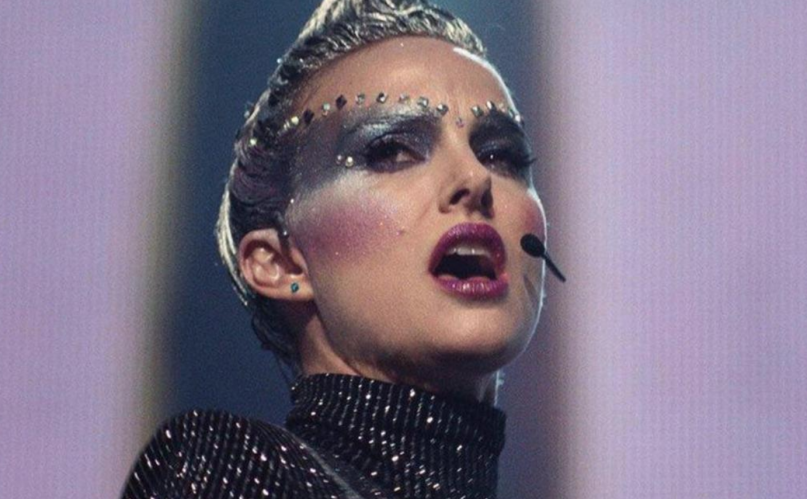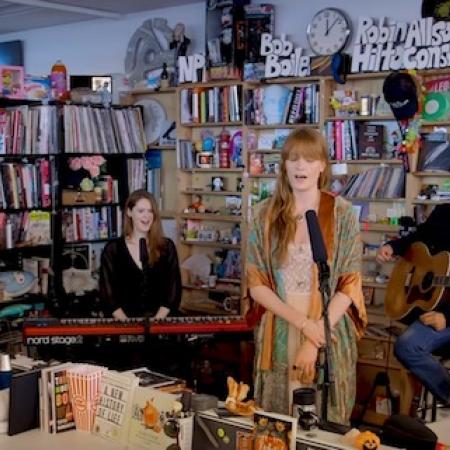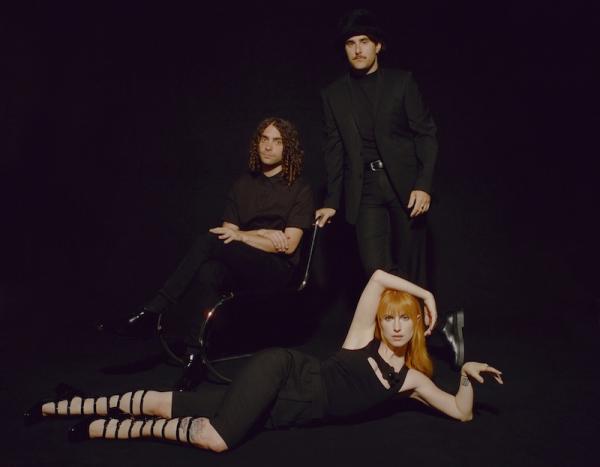In the second part of our look back at the 62nd BFI London Film Festival, we bring you two films about a pair of very different musicians, as well as a moving portrayal of a father and son battling through the younger's drug addiction.
'Vox Lux' (dir. Brady Corbet)
Subtitled by writer-director Brady Corbet as ‘A Twenty First Century Portrait’, ‘Vox Lux’ follows school shooting survivor turned popstar Celeste across a prologue, two acts and a finale. It’s a film that tries to distil the entire social and cultural psyche of a nation across two decades in under two hours, and perhaps unsurprisingly, doesn’t quite succeed.
Celeste rises to national fame in 1999 as a beacon of hope following a gun attack on a school (a nerve-shattering opening that culminates in a mind-bendingly horrific image) in her Staten Island hometown. As the sole survivor from her music class, having been shot in the neck and hospitalised, she performs a song at a vigil that she wrote with her older sister, Ellie (Stacy Martin). 16-year-old British actress Raffey Cassidy (‘The Killing of a Sacred Deer’) gives the teenage Celeste fragility and determination, and soon she’s been spotted by Jude Law’s music manager, thrust into the recording studio and Celeste, the Pop Star, is born.

There’s lots to digest here: mass shootings, substance abuse, terrorism, teen pregnancy, media pressure on children, media pressure on celebrities. The screenplay sags a little under the weight of this plethora of topics, but still manages to engage throughout. It’s elevated by Sia’s original music – which is believably catchy but rather anachronistic, feeling a lot more 2017 than turn of the millennium – and Keri Langerman’s magnificent costumes, particularly approaching the film’s climax, which help to position Celeste as a convincing icon of the pop A-list. Also bringing the film uncomfortably close to home for pop fans is an aspect of the Act Two narrative: on the day we follow Celeste 2.0, a connection is made between an outfit from her early career and those worn by terrorists during an attack in Croatia. Her publicist (an excellent Jennifer Ehle) suggests that, to them, Celeste is “a symbol of moral corruption in the West,” a theory that recalls statements made by those trying to make sense of last year’s bombing of Ariana Grande’s Manchester Arena concert.
It’s in Act Two that ‘Vox Lux’ soars. As the 31-year-old Celeste, Natalie Portman is on fire. Part St. Vincent, part Lady Gaga, part Katy Perry, but also a star unlike any that we have today, she’s caustic and outspoken, yet still fragile at her core. A scene in a diner between Celeste and her daughter Albertine (Cassidy’s second role in the film and the one in which she truly comes into her own) is phenomenal. We watch in horror at the monster Celeste has become, a distant mother – her daughter palmed off to her sister to raise – only able to talk about herself. She may have a repulsive personality, but the neurosis of Portman’s performance is magical, making Celeste 2.0 a fascinating, endlessly watchable trainwreck.

Corbet handles his 112 minutes bizarrely, with an extended opening credits sequence that looks gorgeous but long overstays its welcome, and closing with a ten-minute concert that brings little in the way of resolution. His placement of the 16-year time jump means we lose a key moment in Celeste’s life, one that has the makings of a national scandal, and we’re left to fill in the gaps. We clunkily learn about a damaging legal battle via Willem Dafoe’s voiceover, one of the film’s few consistent features. As a vessel for exposition, this narration works best when explaining, over fast-forwarded home video sequences (reminiscent of the camcorder footage from the same era that formed a large part of the recent M.I.A documentary ‘MATANGI / MAYA /M.I.A’), how Celeste and Ellie were sent off to Sweden to work with an unknown, Max Martin-esque producer. It’s when this voiceover starts doing heavier lifting, referring to its subject as “a prisoner of a gaudy and untenable present,” that Corbet gets carried away with wistful poeticism and loses sight of the device’s usefulness.
All in all, ‘Vox Lux’ is that rare, novel thing: a film that seems too short. If this is a portrait of the 21st Century – or a portrait of a product of the 21st Century – it’s more presentational than exploratory. We don’t have time to truly get to know the Celeste under the glitter, and it seems that it’s the events that happen to her that make her a figure of her times, rather than anything to do with her inherent character. Celeste 1.0’s story ends shortly before 9/11, and the voiceover suggest that her “loss of innocence curiously mirrored that of the nation.” Corbet measures her career in World Trade Centers: in Act One, shots of the New York skyline linger on the Twin Towers, and in Act Two, we slowly pan up the Freedom Tower built in their place. These parallels and suggestions are noteworthy, but not revelatory. “It’s about rebirth,” Celeste 2.0 tells a journalist in a fiery, antagonistic exchange, putting into words the symbols Corbet has been utilising.

As Ellie, Stacy Martin has a stoic quality that stops her from slipping fully into pushover territory. “You sing better than me,” Celeste tells her sister in 2001, to which she's given a sharp "I know" in response. It's a scene that calls to mind the relationship between the Maine brothers in Bradley Cooper’s recent ‘A Star Is Born’. The stark difference in Cassidy and Portman’s portrayals of Celeste is arresting, and even believable for someone who’s clearly lived such a whirlwind existence. It’s a shame not to see a similar change in Ellie. That’s not to discredit Martin, who, like Cassidy, does her finest work in Act Two, but it’s hard not to imagine what another, older actor – say Rebecca Hall, whom Martin strongly resembles – could have brought to a hardened, weary Ellie.
Despite all the mis-steps, ‘Vox Lux’ is a great deal of fun, thanks largely to Portman’s insane, virtuosic performance. But there is plenty to get frustrated about. Perhaps the attempt to portray a figure who epitomises a generation that is in fact several, an era that is too vast and ever-changing to be just one, was a task too ambitious to execute successfully. But this is an impressive effort, and it’s admirable that Corbet even tries to bite off this much of our culture, even if he can’t chew it all.
'Vox Lux' will be released in the US on 7th Dec. International release dates are yet to be announced.
'Beautiful Boy' (dir. Felix van Groeningen)
Based on two autobiographies by David Sheff and his son Nic, ‘Beautiful Boy’ brings Timothée Chalamet back to our screens, a year after setting the world – particularly the internet corner of the world – on fire in ‘Call Me By Your Name’. As Nic, he is a frustrated and troubled teenager whose wild personality is sent on a downward spiral of drug addiction, leaving his father David (Steve Carell) to pick up the pieces and do what he can to understand and heal his son.

Structurally, it’s as chaotic as its subject. We jump this way and that, forwards and backwards in time, with flashbacks and jumps forward vaguely collected around a central narrative following Nic’s descent into addiction (from 2002 to 2007, with the changing technology of this era quietly and delightfully demarcating the passage of time). At its weakest, it’s a destabilising technique that seems aimless, and it’s unclear why the structure hangs so heavily around a scene in which David pitches an article about Nic’s struggles.
But at its best, we’re given moments of time-collapsing brilliance, often initiated by music. Two scenes, one in which a teenage Nic shares a joint with his father for the first time and, in the ‘present’, a montage of David researching the impact of meth addiction on the brain, run concurrently because David Bowie’s ‘Sound and Vision’ comes on the radio in the latter and takes David back to the former. It doesn’t always work and it’s certainly not clean, but then neither is recovery. There are interruptions and bumps in the road for both the story and for Nic, and director Felix van Groeningen just about gets away with making a parallel out of their shared unpredictability.

The most rewarding reading of ‘Beautiful Boy’ is also the simplest: it’s a film about love. For the most part, this is the love between a father and a son. Their bond pulls hard on the heartstrings, particularly when we learn the origin of their habit of muttering “Everything?”, “Everything,” as a way of saying goodbye. Every hug between Carell and Chalamet can be felt, and each one is a moment that van Groeningen savours. With less talented or committed actors than this pair, the material may not fly. But between Chalamet’s furrowed brow as he tries to keep his head and his story straight, and Carell’s wide eyes, looking afresh on the frightening new form his son is taking, there’s a magic that happens. ‘Beautiful Boy’ is strongest when they share the screen and can feel a little directionless when they don’t.
Regardless of how assured the journey is to get you there, ‘Beautiful Boy’ will likely leave you emotionally shattered. Only the coldest of hearts won’t be wrapped up in this bitter yet loving tug of war between father and son.
'Beautiful Boy' will be released in New Zealand on 29th Nov, in the UK on 18th Jan, and is out now in the US.
'Wild Rose' (dir. Tom Harper)
Our ambitions and dreams are often hard for others to understand, and a life spent chasing a goal can be a lonely one. This is exacerbated further if you’re a fish out of water, a unique spirit who sticks out like a sore thumb in your environment, knowing there’s somewhere else that you ought to be, somewhere where you’ll be better understood. That’s the story we see in the remarkablly fun new Scottish comedy, ‘Wild Rose’.
The film follows Rose-Lynn Harlin, a young mother from Glasgow who, following a brief stint in prison, sets out to get her life back on track and follow her dreams of becoming a country (not “and western”, as she repeatedly points out in a brilliant running gag) superstar. One among the many obstacles in her way is her location: Scotland’s biggest city is a long way from Nashville. While it may not be convenient for Rose-Lynn, the Glaswegian setting is mined for its comedic brilliance by BAFTA-winning writer Nicole Taylor, with a great deal of uniquely Scottish humour bringing some of the biggest laughs.

Directed by Tom Harper, ‘Wild Rose’ is a beautiful, big-hearted gem of a British comedy. It has some shared DNA with John Carney’s 2016 glorious Irish mini-hit ‘Sing Street’, but the added exploration of motherhood here elevates the emotional impact. While Rose-Lynn’s children are sometimes obstacles to her goal, they’re never neglected or unwanted. We don’t judge her for being ambitious in the face of motherhood; rather its her status as a mother that helps us root for her. In fact, all three of the main characters – Rose-Lynn, her mother Marian (a quietly powerful Julie Walters) and the upper-class woman whose mansion Rose-Lynn cleans, Susannah (Sophie Okonedo) – are mothers balancing their passions with their roles as caregivers. The unlikely friendship that blossoms between Rose-Lynn and Susannah is one of the film’s great joys, as Rose-Lynn’s ambition becomes Susannah’s ill-conceived passion project.
As Rose-Lynn, Jessie Buckley is note-perfect. Off the back of her dazzling lead performance in the dark, quietly brilliant British indie mystery ‘Beast’, Buckley continues to prove herself as one of the most committed and versatile young actors working today. Here, she’s a bundle of joyous energy, which Buckley skilfully presents as both completely genuine and hiding a darker disappointment in herself. Her attempts to balance her maternal responsibilities with her searing ambition is the battle at the film’s core, and we watch encouragingly as Rose-Lynn tries to keep both her dreams and her family intact.

While the laughs are aplenty, Harper isn’t shy in adding ladles of emotion to his punchy, pacy film, and upon reaching the film’s show-stopping climactic song, he and Taylor have done more than enough to earn our tears. In Rose-Lynn Harlin, they and Buckley have created a character so instantly loveable yet deeply flawed that we can’t help but be drawn to her and support her dreams. If seen by a wide enough audience, ‘Wild Rose’ has the making of a smash hit, and Jessie Buckley’s mesmeric performance ought to catapult her right up into the A-list.
'Wild Rose' will be released in the UK on 19th April and in the US on the 10th May. Further international release dates are yet to be announced. Watch the cast and crew discuss the film on the London red carpet below:



 Film News
Film News







